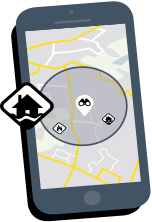Landslides happen often in Victoria. Large landslides are most common after bushfires or flash flooding. Know what to do to when a landslide occurs.
What to do before, during and after a landslide
Over 180 landslides occurred along the length of the Great Ocean Road in 2016, and over 190 landslides within the Grampians National Park in 2011. Both of these events resulted in significant impacts on public infrastructure, tourism and the economy.
Take notice of the landscape around you
-
If you notice considerable changes to the landscape that show land is moving, immediately contact:
-
The landowner (if on private property).
-
The road authority (if on the roads).
-
Local government (if on public property).
-
-
Fire affected are at a higher risk of landslides due to damaged vegetation and soil structure.
-
Plan any travel in advance – trips may take longer due to closed roads and poor driving conditions.
Landslide warnings
There are no warnings for landslides however landslides may be triggered by other events such as earthquakes, heavy rain and flooding.
During a landslide
-
You need to act quickly if a landslide occurs:
-
If you are outside, move away quickly and keep clear of embankments, trees, powerlines and poles.
-
If you are inside during a landslide, move to the part of the building that is furthest away from the approaching landslide and take shelter under a table or bench.
-
-
Call 132 500 for emergency assistance from VICSES.
-
Call Triple Zero (000) in life threatening emergencies.
-
Stay away from landslides. Landslide slopes may continue to move for hours to days afterwards.
-
Roads may become closed due to dangerous driving conditions caused by landslides, and communities may be isolated due to blocked or damaged roads.
-
Stay informed – monitor emergency warnings through the VicEmergency app, website and hotline (1800 226 226).
After a landslide has occured
-
Stay away from the impacted areas to allow emergency services to help affected communities.
-
Stay informed – monitor emergency warnings through the VicEmergency website, app and hotline (1800 226 226).
-
Call 132 500 for emergency assistance from VICSES.
-
Call Triple Zero (000) in life threatening emergencies.
-
Do not re-enter damaged buildings until authorities advise it is safe to do so.
-
Stay safe by avoiding damaged buildings, fallen trees and powerlines, blocked or damaged roads. Be aware of other hazards caused by the landslide.
-
When cleaning, protect your health and safety. Wear strong boots, gloves and protective clothing and wash your hands and clothes regularly.
-
Electricity, gas and water supplies may be disrupted. If your property has been damaged, have all utilities checked and tested by a licenced technician before you use them.
Landslides after bushfires
Bushfires can have long-lasting impacts on the natural environment, increasing the dangers from floods and storms, and the chance of landslides:
-
Plants and tree roots help to stop landslides from happening by absorbing water and holding the ground together. After bushfires, rain and the loss of plants and roots can make the ground soft and heavy, leading to a greater chance of landslides.
-
Landslides can carry debris such as boulders and trees downhill, and cause serious damage to buildings. They can be extremely dangerous to anyone on or below the affected area.
-
The risk of a landslide occurring in a burnt area depends on how steep the land is, the number of remaining trees to support the land, the soil composition, and the structure of the rocks below the surface
When to call VICSES for a landslide
VICSES is the control agency for landslides in Victoria.
If a landslide has occurred, call 132 500 for emergency assistance if:
- A landslide of rocks and soil is blocking the road.
- A landslide of rocks and soil is impacting your home.
- A large hole or crack has opened up in the ground (sink hole), and is close to a road or building.
If anyone’s life is in danger, call Triple Zero (000).








